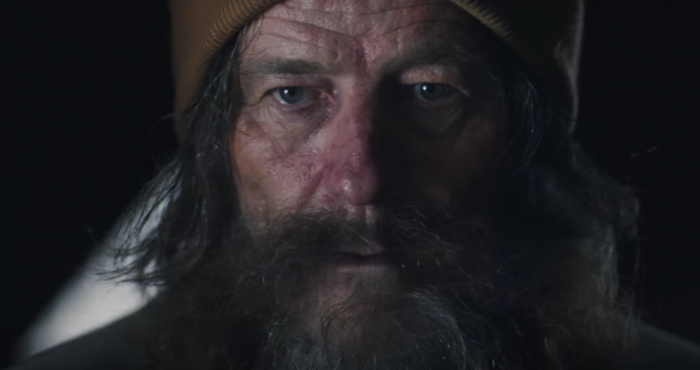
WAKEFIELD
IFC Films
Director: Robin Swicord
Written by: Robin Swicord
Cast: Bryan Cranston, Jennifer Garner, Jason O’Mara, Beverly D’Angelo
Screened at: Review 2, NYC, 5/1/17
Opens: May 19, 2017
Think of Syrian refugees who escape the bombings in Aleppo and arrive to our in tatters without two dimes to rub together. Can you begin to imagine what they would think if they saw Robin Swicord’s movie “Wakefield” (Arabic subtitles)? “These Americans are completely crazy,” they would say. “Did we come to a country that’s one big lunatic asylum?” What would baffle these good folks no end is the idea that an upper-middle-class Wall Street partner, Mercedes car in his two-car garage and a large house in a suburb of New York City, would chuck the whole thing and become a vagabond, a bum. True, some people in the business world might go into a low-paid teaching job when they retire at 55 or even quit the firm looking for a profession without the pressure of producing for the bosses. There are even people who desert their families and take off to a distant state and begin a whole new life. But to give up your wife, your two children, your home, your credit cards, only to move to the attic next door and live there for a year? To grow a beard like Rip Van Winkle, dumpster-dive for what the perfectly good food that the neighbors have thrown out, including melted Ben & Jerry’s ice cream, segments of a steak, a baked potato that would taste oh-so-good if you’re hungry enough?
Howard Wakefield is that guy who appears to flip out, tired of the same old routine, driving to the station and taking the train to Grand Central, sitting in on parties initiated by his wife and attended by people including one guy who he thinks is flirting with his wife and one woman, Babs (Beverly D’Angelo) to whom he accords the epithet “bitch.” Howard, in fact, looks like somebody out of the casting of TV’s “Mad Men,” one of those handsome, if bland characters with an inflected American pronunciation, who has the usual two kids, and pays the mortgage and the insurance policies. It helps writer-director Robin Swicord, who was partially responsible for “The Curious Case of Benjamin Button” (surely a more creative project than “Wakefield”), that she enlisted Bryan Cranston for the title role. Cranston, who showed us that he is one of the great actors of his generation with his portrayal of the blacklisted screenwriter Dalton Trumbo, now follows up with a virtual one-hander as narrator and performer in this theatrical piece of celluloid.
One day, after having a nervous breakdown, Howard Wakefield (Bryan Cranston) takes the train from Manhattan’s Grand Central station to his suburban home, but after a breakdown of the train and a necessary hike along the tracks, he decides to forego entering his home. Instead he camps out in the attic next door, using the days, weeks and months to spy on his wife Diana (Jennifer Garner), who always leaves her blinds open. Diana reports the missing husband, and the police arrival is observed by Howard, who can virtually read his wife’s lips and mimics what she is saying using his impression of her voice. That he’s talking only to himself and the movie audience probably means that he is psychologically a goner, especially when he laughs hilariously at scenes that would make a normal person cry.
He is discovered in his lair by two developmentally disabled kids, Emily and Herbert (Pippa Bennett-Warner and Isaac Leyva) who live in the adjacent home under the care of a professor, but they agree to keep his secret—though if you watch the young girl giggling, you realize that she is happier than Wakefield. He presumes that a fellow employee, Dirk Morrison (Jason O’Mara) is hitting on his wife and unable to think that he might be wrong about her reaction to this flirtation.
There’s a reason for Howard’s narration. He is quoting from a short story by E.L. Doctorow, who like John Updike frequently wrote about upper-middle class suburban life. Such narration does not often work in the movies, where screenplays should be acted and not spoken, and it does not help the film here either. Still, Bryan Cranston is a superior showman whose virtual one-man show is the movie, though without him probably someone like Kevin Spacey could do the job almost as well. Note also that Doctorow has virtually taken the story from Nathaniel (“The Scarlet Letter”) Hawthorne’s 1835 study of the same name which took place in London and was published in the New England Magazine in May of that year. One literary critic noted that “even as Hawthorne castigates Wakefield, he colludes with him relishing an ordinary man’s extraordinary caprice.” Go the source, namely one of America’s great writer of short stories and full-length fiction, and you’ll see that even in 1835, “Wakefield” seems remarkably modern, treating a man’s escape from marriage and the routine of his life.
Rated PG-13. 106 minutes. © Harvey Karten, Member, New York Film Critics Online
Comments, readers? Agree? Disagree? Why?
Story – B+
Acting – B+
Technical – B
Overall – B





